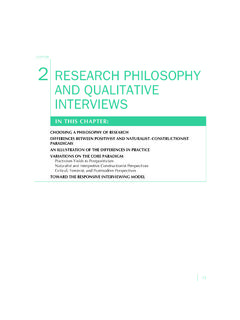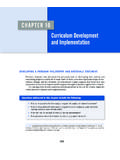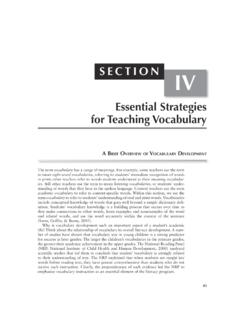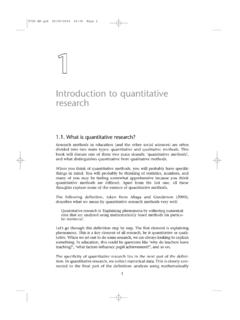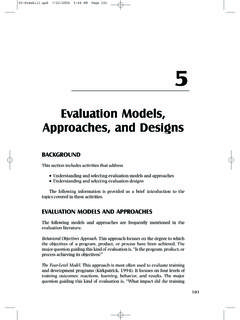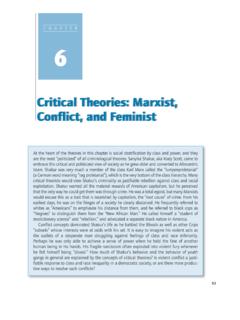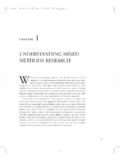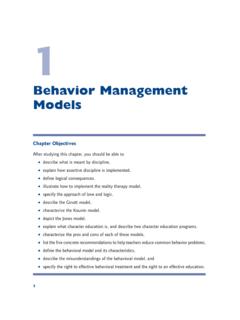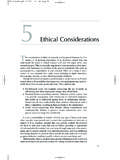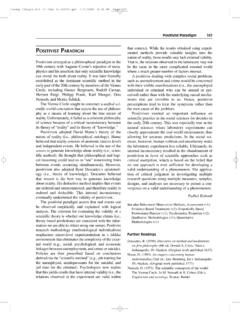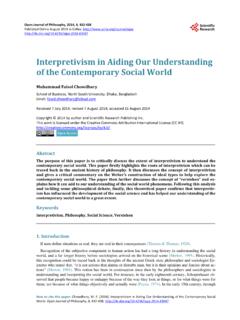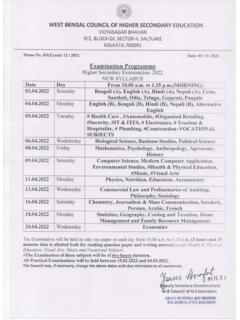Transcription of Educational Philosophy and Theory - SAGE Publications Inc
1 SECTION IEducational Philosophy and 19/15/2009 6:00:22 PM9/15/2009 6:00:22 29/15/2009 6:00:23 PM9/15/2009 6:00:23 PMAs any parent of a 3- or 4-year-old child knows, What is ..? questions are extremely troublesome, in large measure because it is rarely clear what answer would satisfy the questioner. Indeed, the common experience is that the young-ster is satisfied by nothing, since any answer that is given is likely to be followed by a series of further questions.
2 The situation is even worse if the questioner (this time an adult) is interrogating a philosopher, as it is virtually certain that the first answer that is received and very possibly the later ones as well will be unsatisfactory. For the philosopher s instinct, when asked What is X? , is not to discourse about the nature of X, but to begin by analyzing the question itself. The questioner is sometimes bamboozled, then, to have the simple-seeming query answered by Well, it is not clear what you are asking for, when you ask what is X.
3 Warming up, the philosopher may point out that the questioner might be seeking a verbal definition of X, alternatively could be after a fuller description of X that would allow cases of X to be identified, or perhaps would be satisfied merely by being given an example of X; some questioners might be searching for the essence of X, or wish to find out what X ought to be, or why X is worth bothering about at might be thought that the situation could not possibly deteriorate any further but when the what is?
4 Question that is directed to a philosopher contains the word Philosophy itself, all hope of receiving a quick, simple and direct answer has to be abandoned, for the philosopher will suggest that the question cannot be 1 What is Philosophy of Education? 39/15/2009 6:00:23 PM9/15/2009 6:00:23 PM4 THE sage HANDBOOK OF Philosophy OF EDUCATION answered until the meaning of Philosophy has been clarified and the nature of Philosophy is essentially contested . And of course this is a very reasonable position to take, and certainly is the one that will be the starting point for the present follows, then, is the slow, complex and indirect answer given by a phi-losopher to the apparently simple question: What is Philosophy of education?
5 And, as indicated, the discussion must start with the nature of Philosophy itself for it should be obvious that individuals holding different conceptions of what constitutes Philosophy will give quite different accounts of Philosophy of educa-tion, and sadly there do indeed exist a number of divergent views about this underlying proceeding, several preliminary issues need to be resolved. First, the dictionary definition is of no help whatsoever. My copy of Webster s II New Riverside is particularly circular, defining philosophize as to speculate or reason like a philosopher, the problem being that when one turns to philosopher the entry is an expert or student in Philosophy .
6 This is followed by a secondly and equally uninformative definition, someone who thinks deeply , which is untenable for two reasons. First, almost everyone thinks deeply about at least some issues, and yet it seems strange to say that everyone is a philosopher; and secondly, not everyone who aspires to think deeply (including the philosopher) actually succeeds in doing so and it also seems strange to say that a philosopher who labours unsuccessfully is on that occasion not being a is important to stress that I am not disputing the fact that many (although certainly not all) philosophers of education think deeply.
7 It is simply that this characteristic cannot be the basis of a definition that purports to demarcate Philosophy of education from other activities. Nor is it being denied that there is an enormous number of complex Educational issues that it is important to think deeply about. Hopefully the discussion that follows and indeed this whole book will make clear the particular contribution that can be made by deep philosophical should make explicit what was left implicit in the discussion above: namely, that there are two broad usages of the word Philosophy and its cognates and these should not be confused.
8 The first of these is the vapid non-technical usage according to which anyone who thinks abstractly about an issue or pursuit that is valued within a society may be called a philosopher; this is what the lexicogra-phers for Webster s had in mind when they crafted the account I cited earlier. I recall having heard the (late) brilliant coach of my local professional American football team being called a philosopher (presumably because of the depth of his analyses of the game); and I have heard the term used to describe certain TV personalities who give lifestyle advice to those who are less fortunate than them-selves.
9 Other examples of this usage of the term can be found by browsing in the Philosophy section of your nearest mega-bookstore. I will not pursue this any further here (but see Phillips, 1985), for it is my purpose in this present dis-cussion to illuminate at least in a preliminary way that will be built upon in 49/15/2009 6:00:23 PM9/15/2009 6:00:23 PM WHAT IS Philosophy OF EDUCATION? 5subsequent chapters the second, more technical usage of Philosophy (and relatedly of course Philosophy of education ); this is the sense of the term that would apply to work done in university departments of Philosophy or programs in Philosophy of education (although I do not want to suggest that this type of Philosophy is pursued only in universities and colleges).
10 And, as hinted earlier, this will be a difficult task enough, for in this world of technical Philosophy there are strong differences of opinion about what it is that Philosophy can achieve and about appropriate standards of rigor and the like; Lucas captured this aspect of Philosophy well when he wrote Someone once remarked sarcastically that if all the philosophers in the world were stretched end to end they would still not reach an agreement (Lucas, 1969, p. 3).A second preliminary matter that needs to be disposed of before we proceed concerns another approach that might be taken to the task of defining Philosophy (and perforce, Philosophy of education), but which turns out to be as frustrating as consulting the dictionary (although, as will become evident below, I will adopt a variant of this strategy myself).
